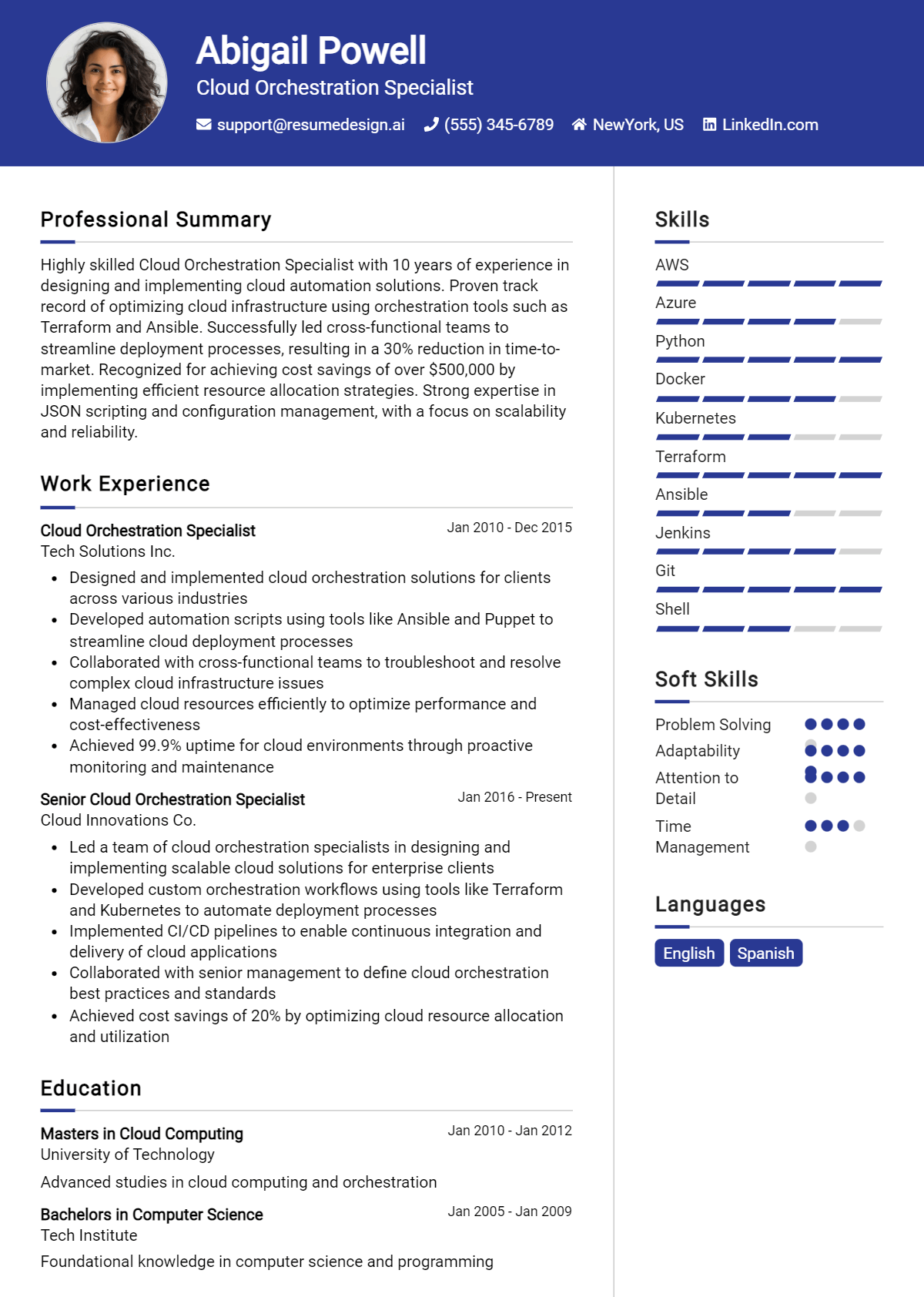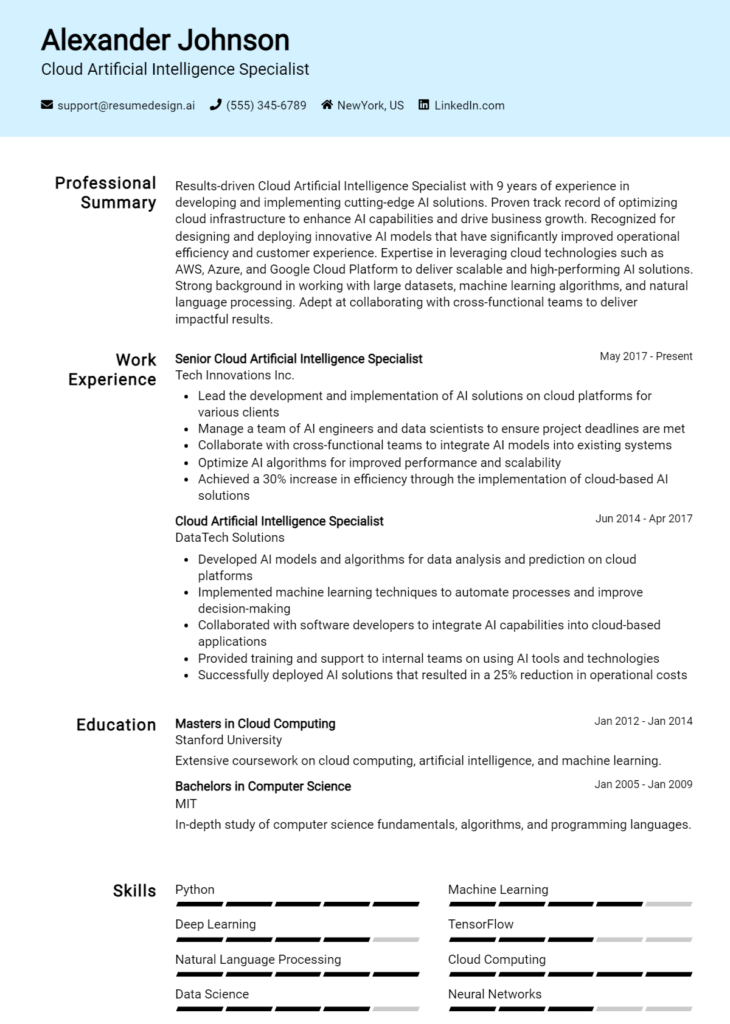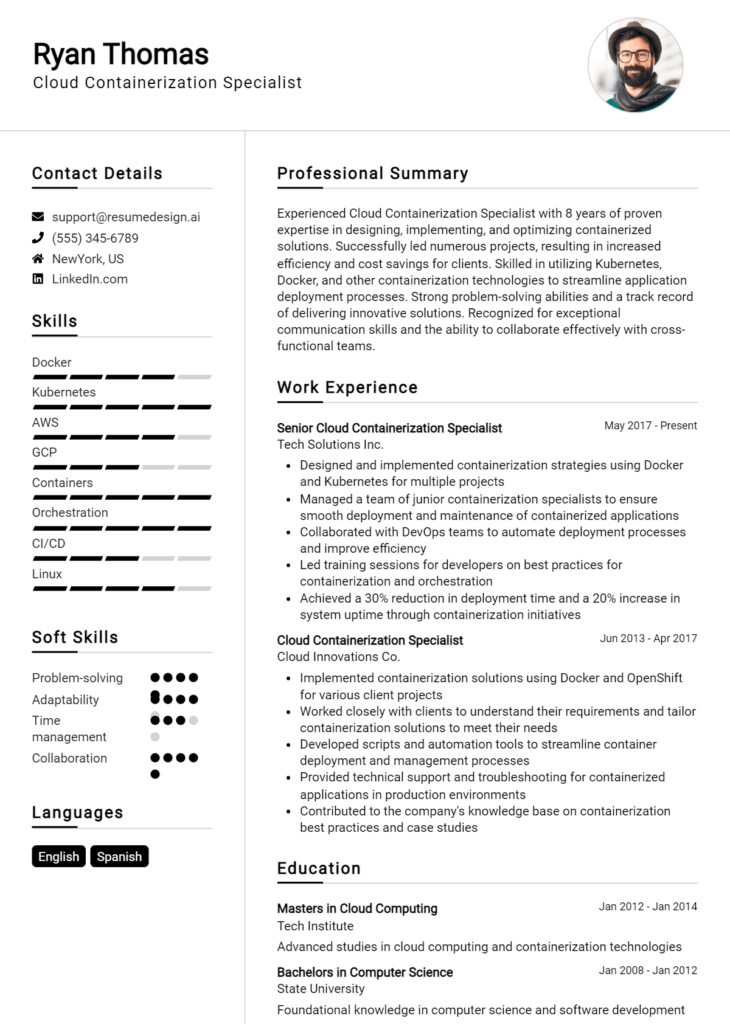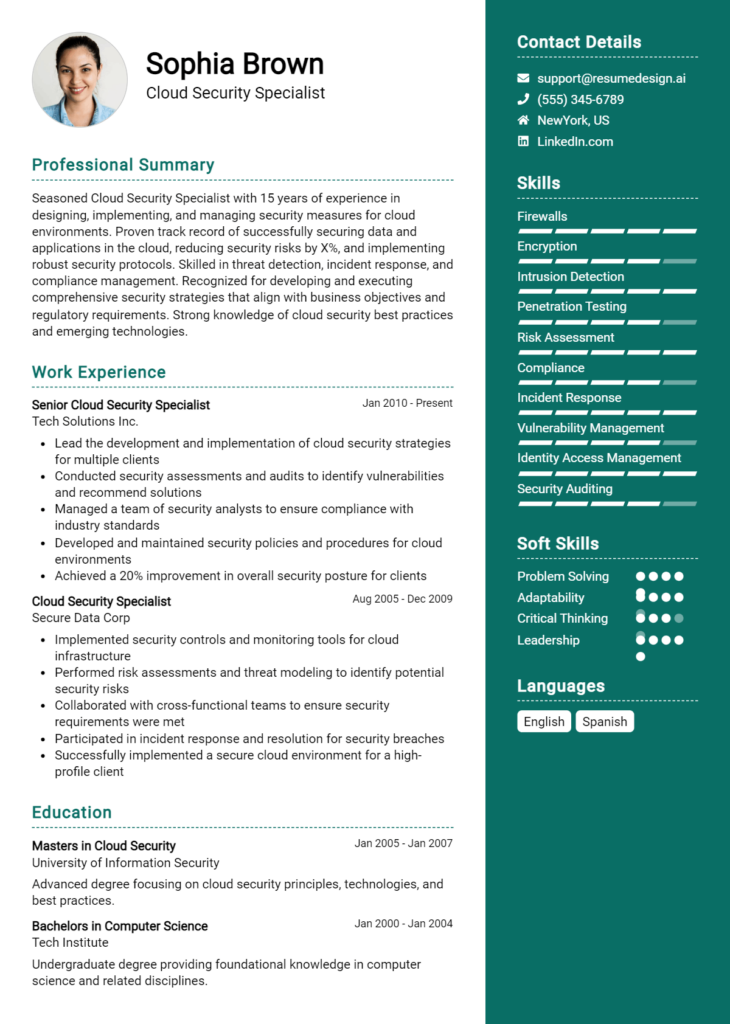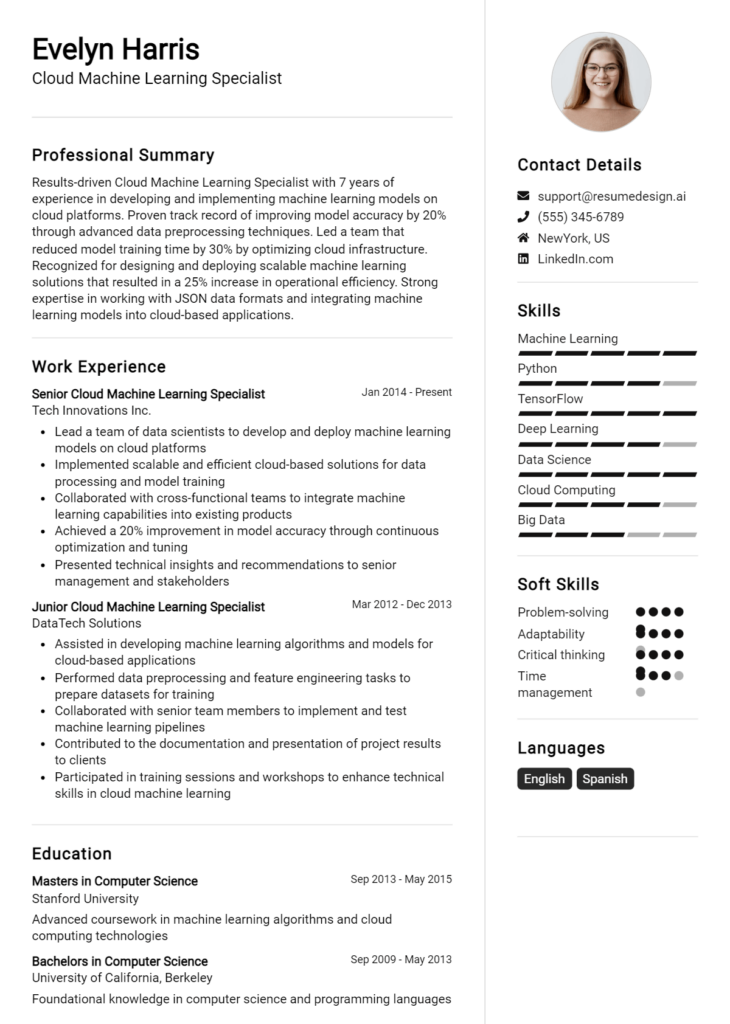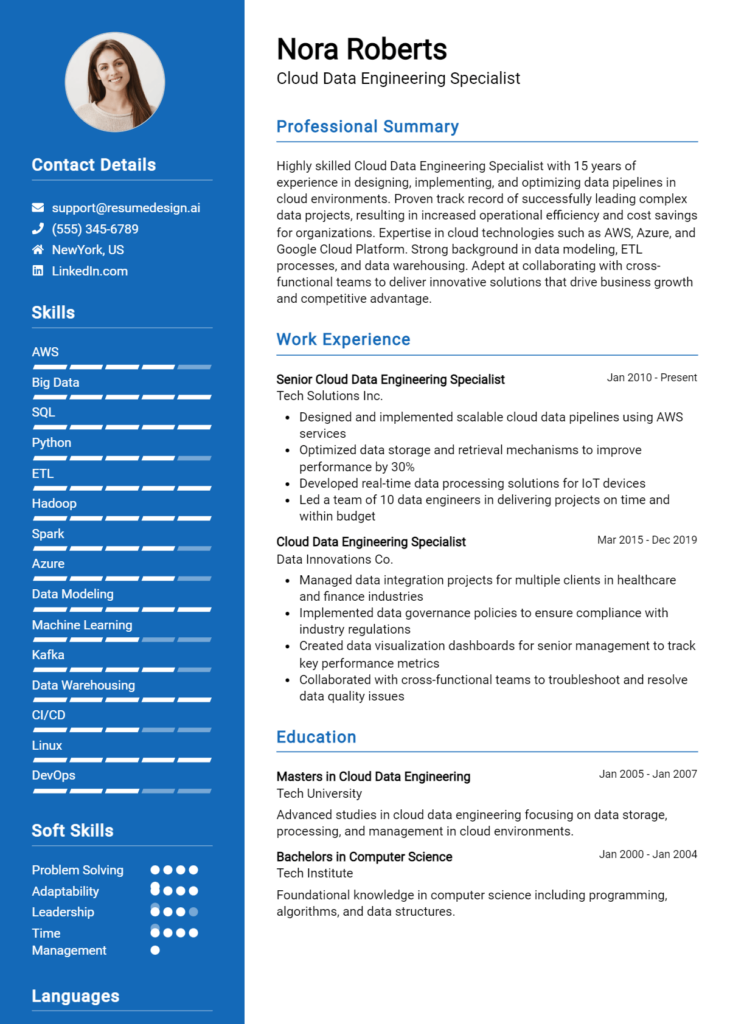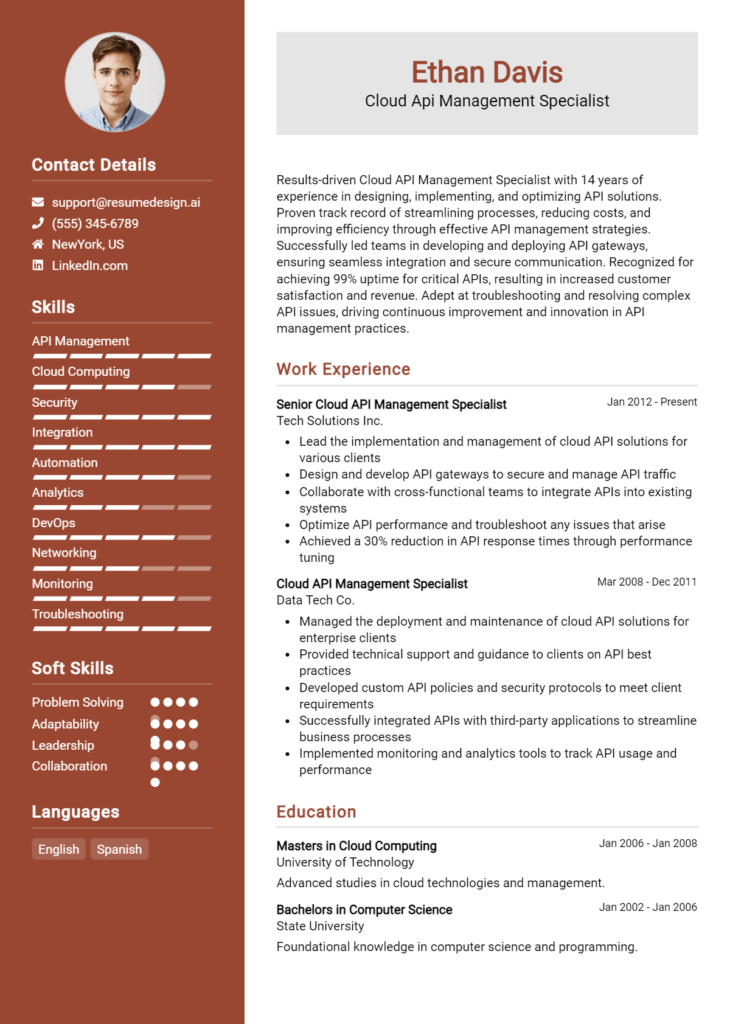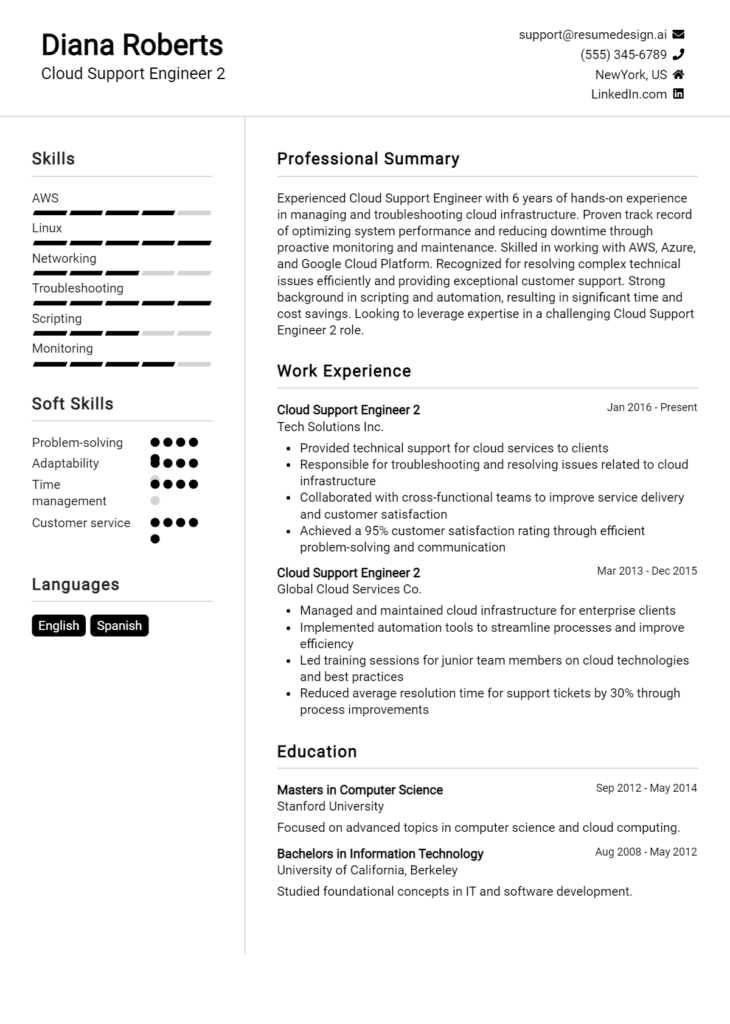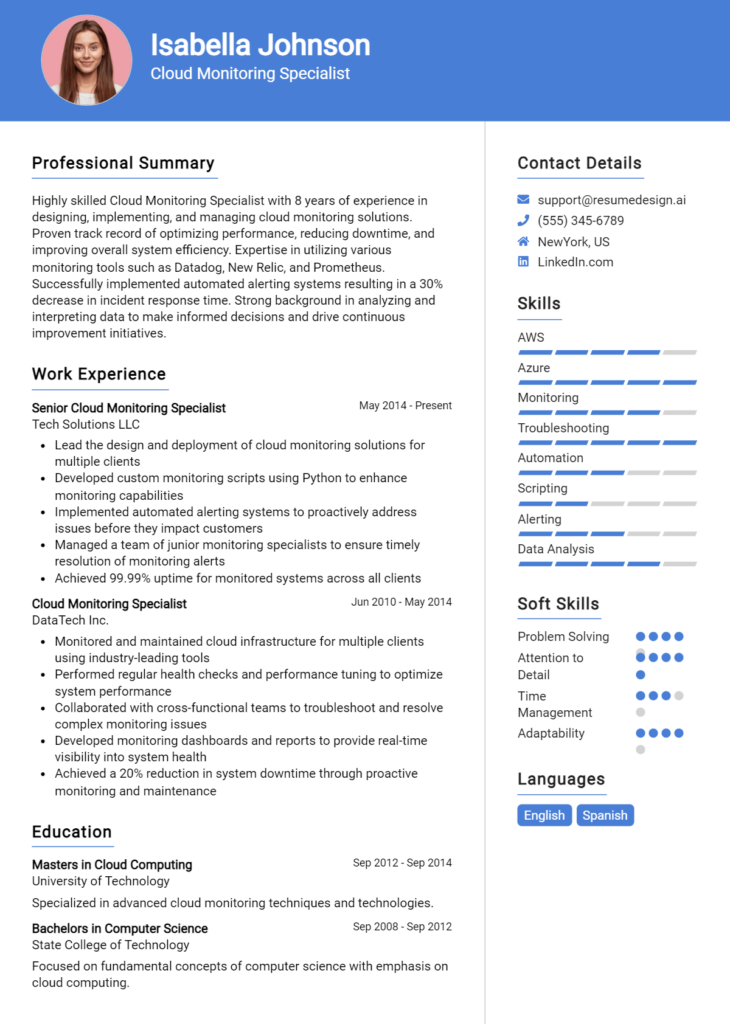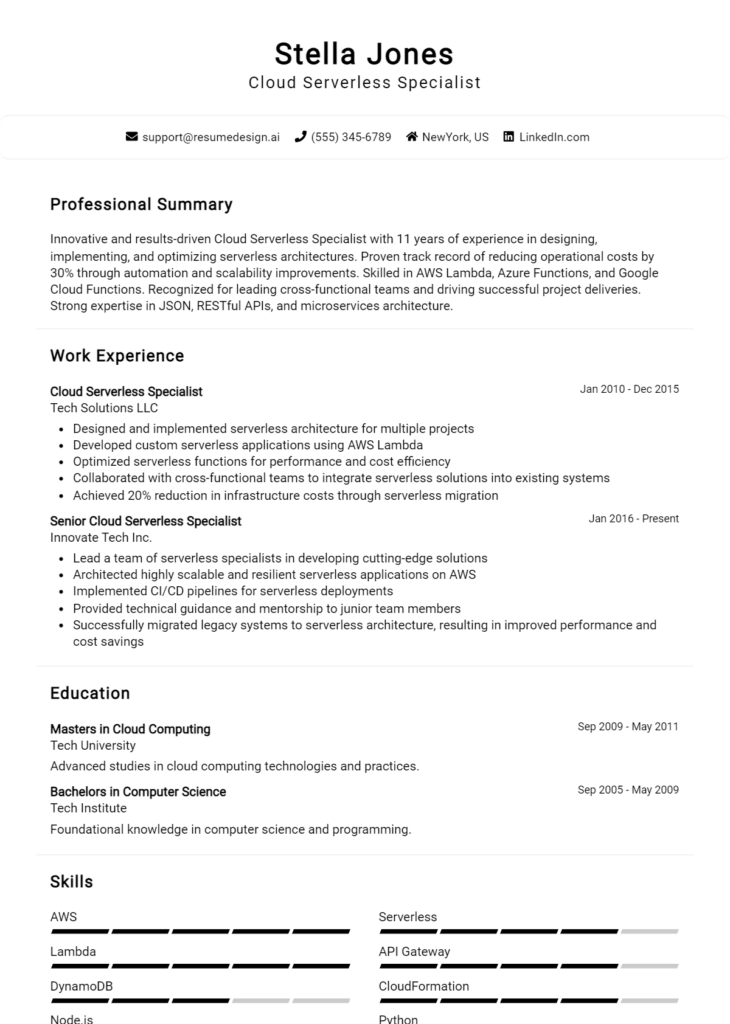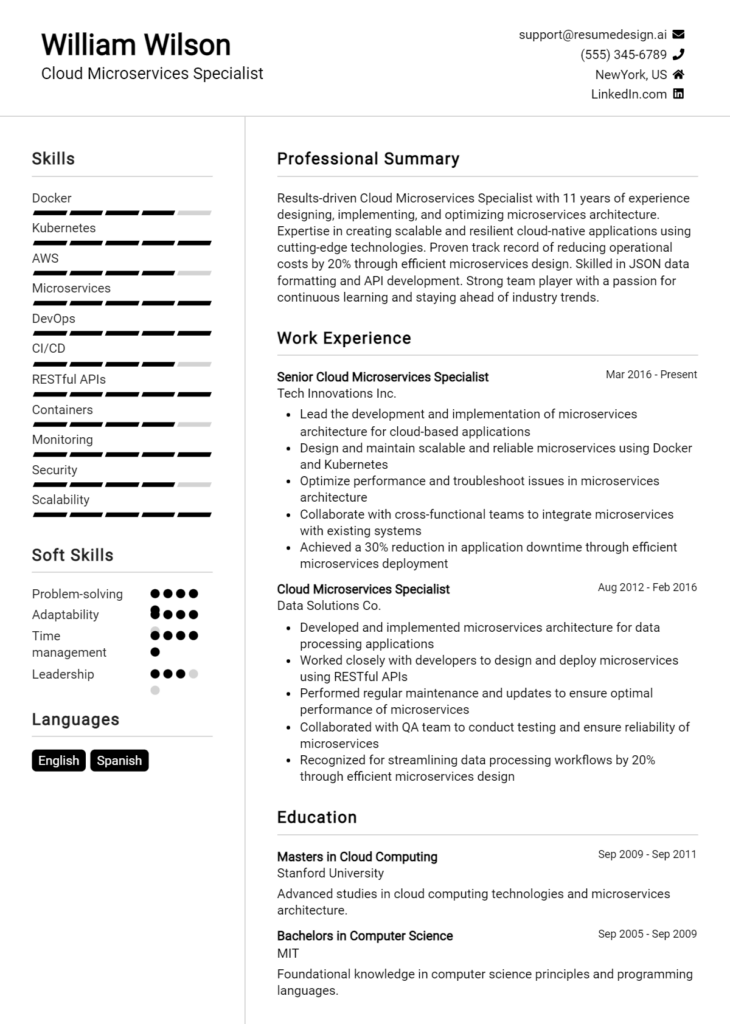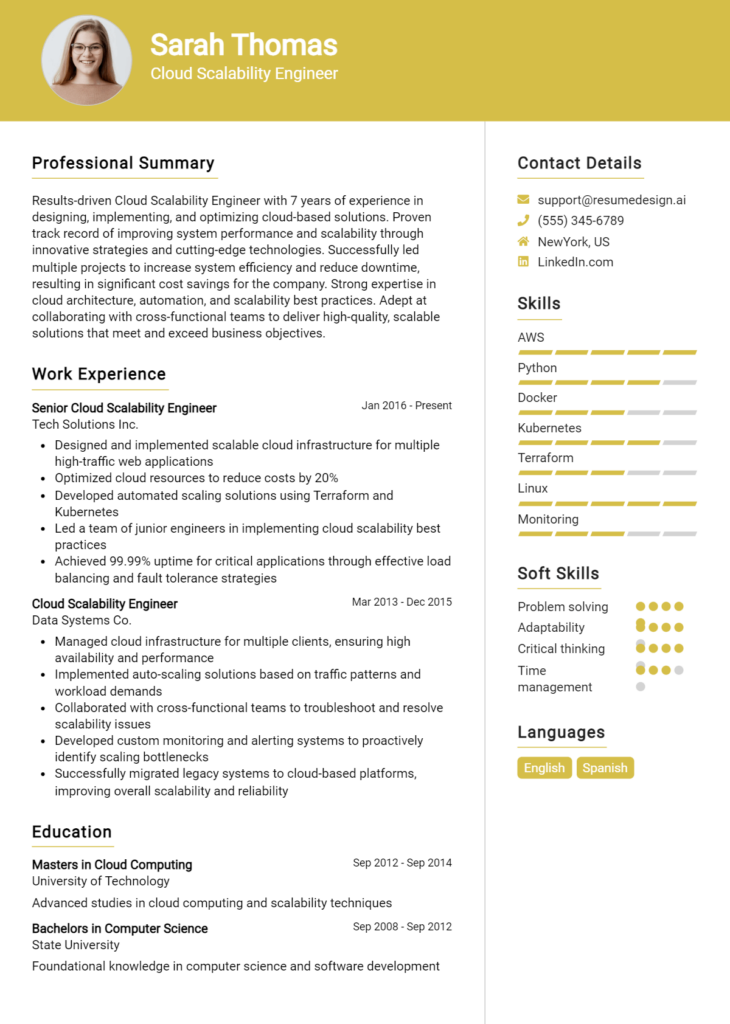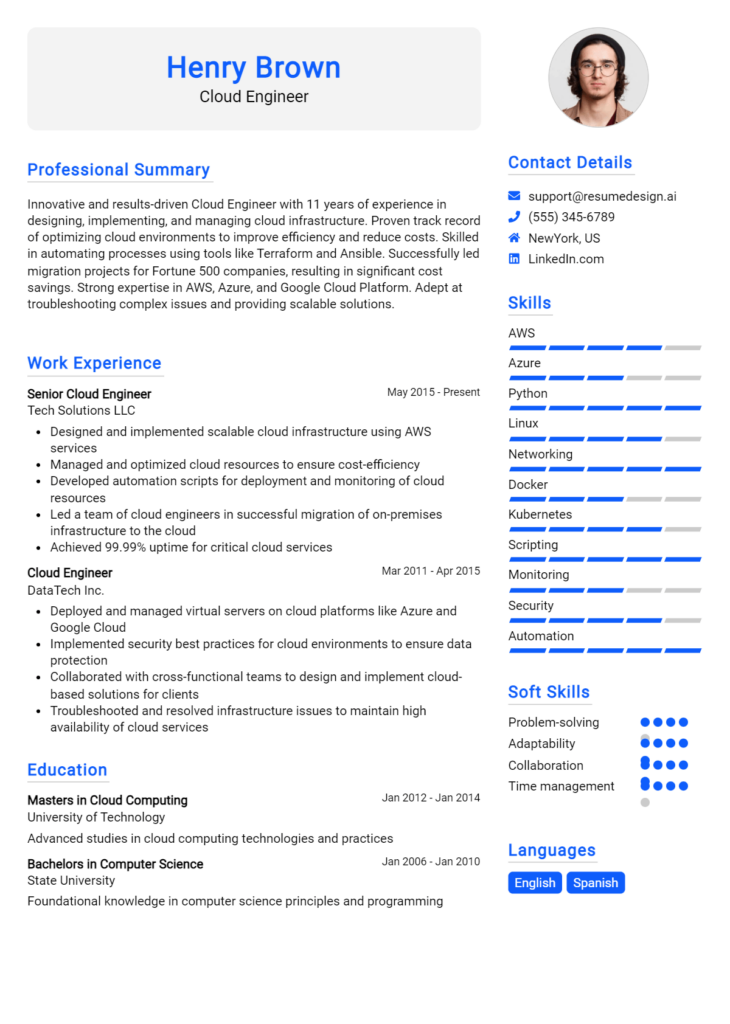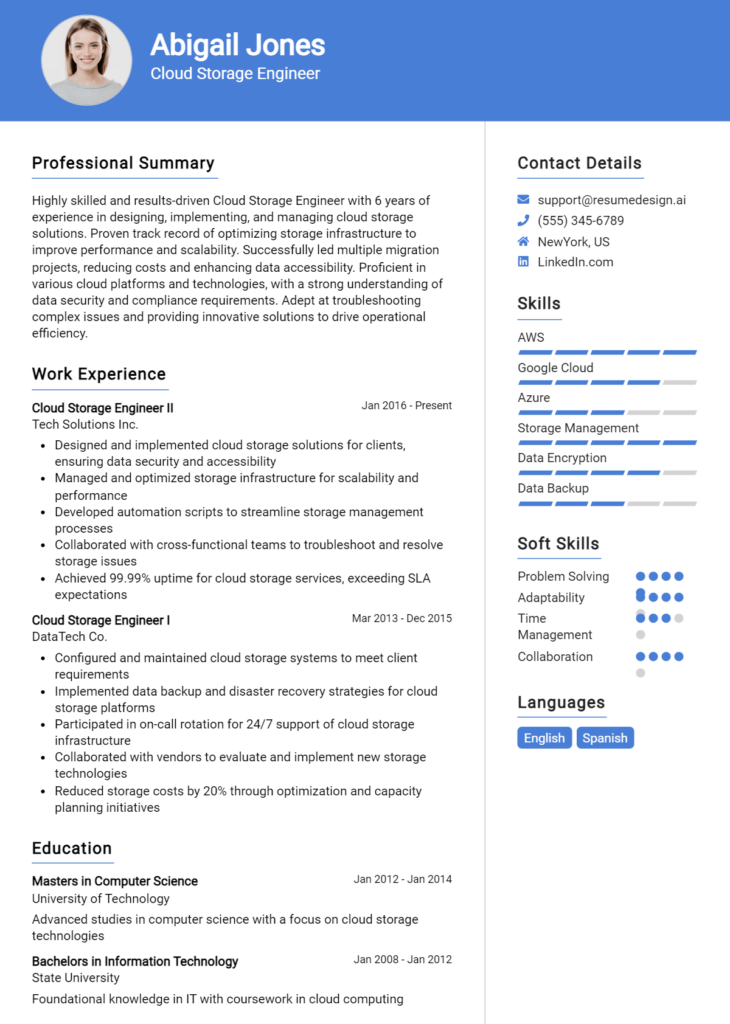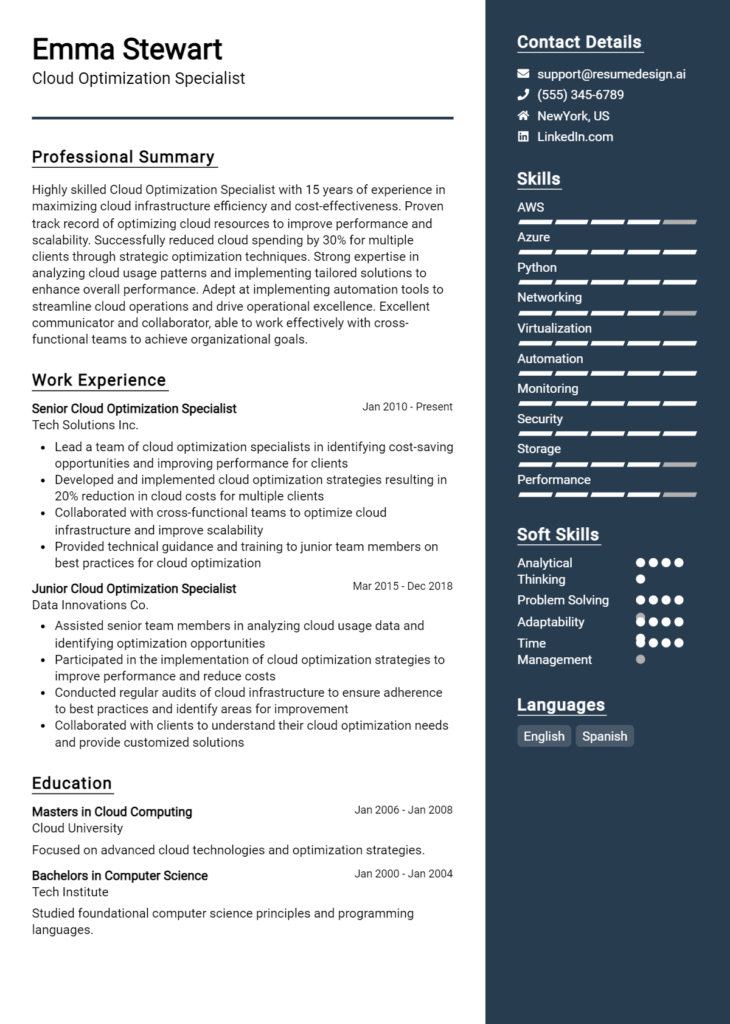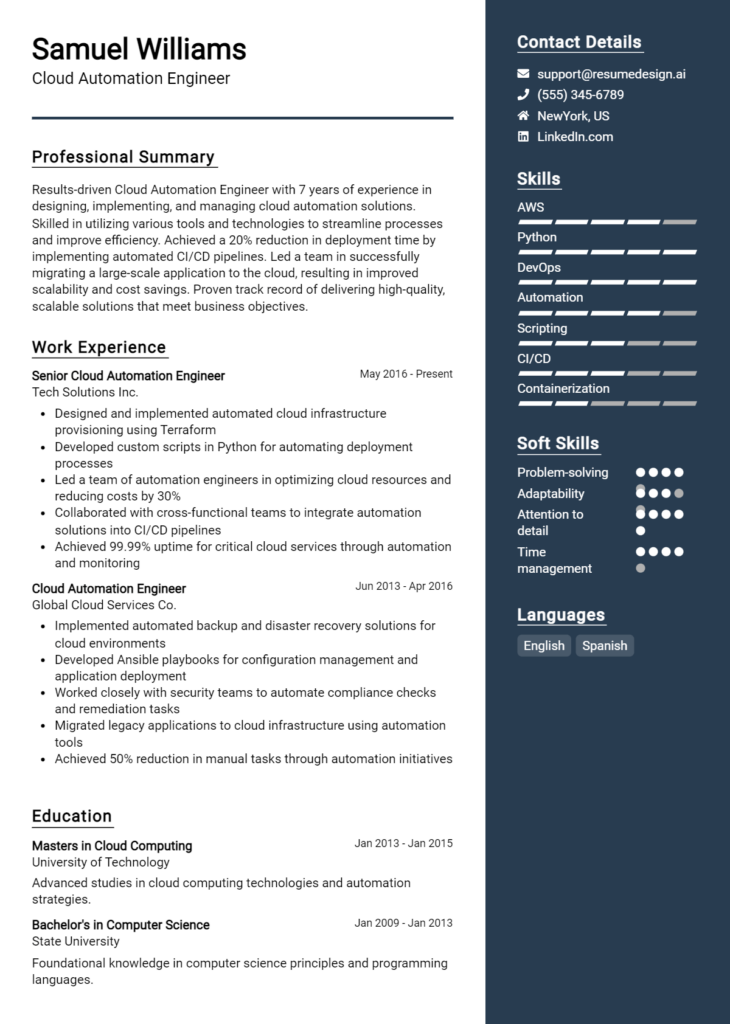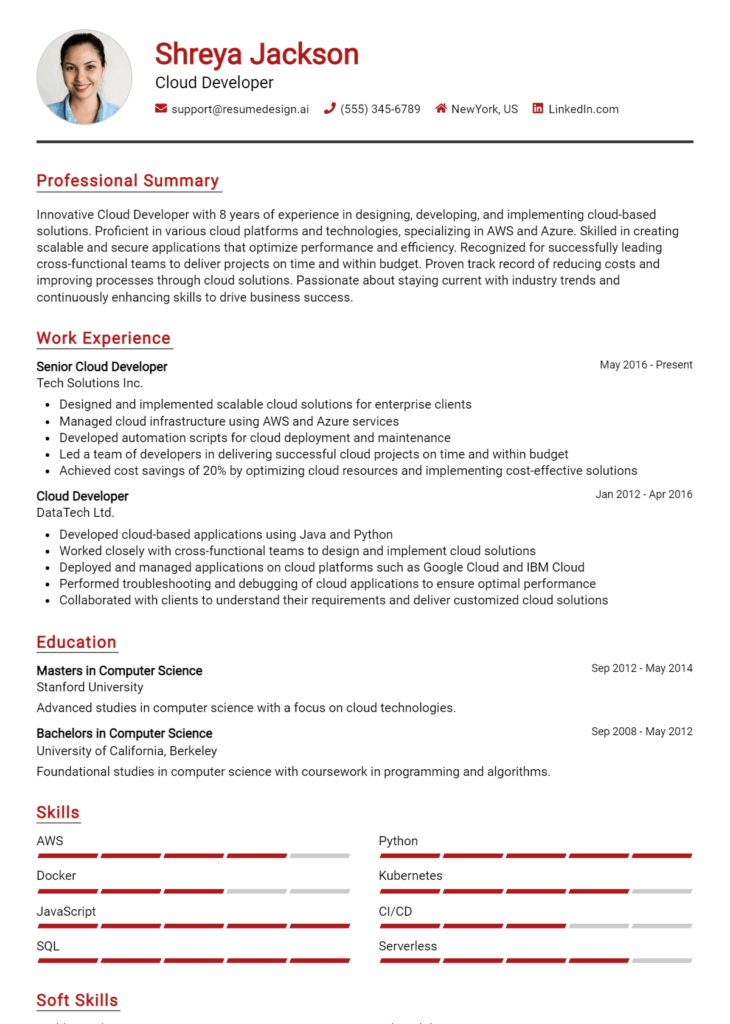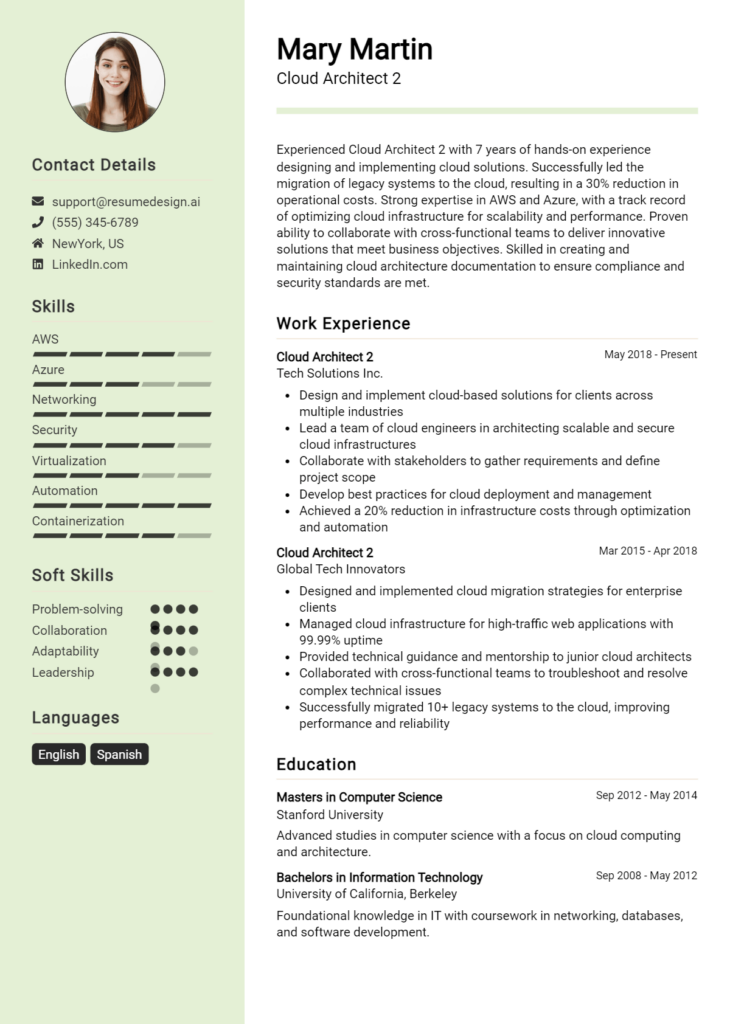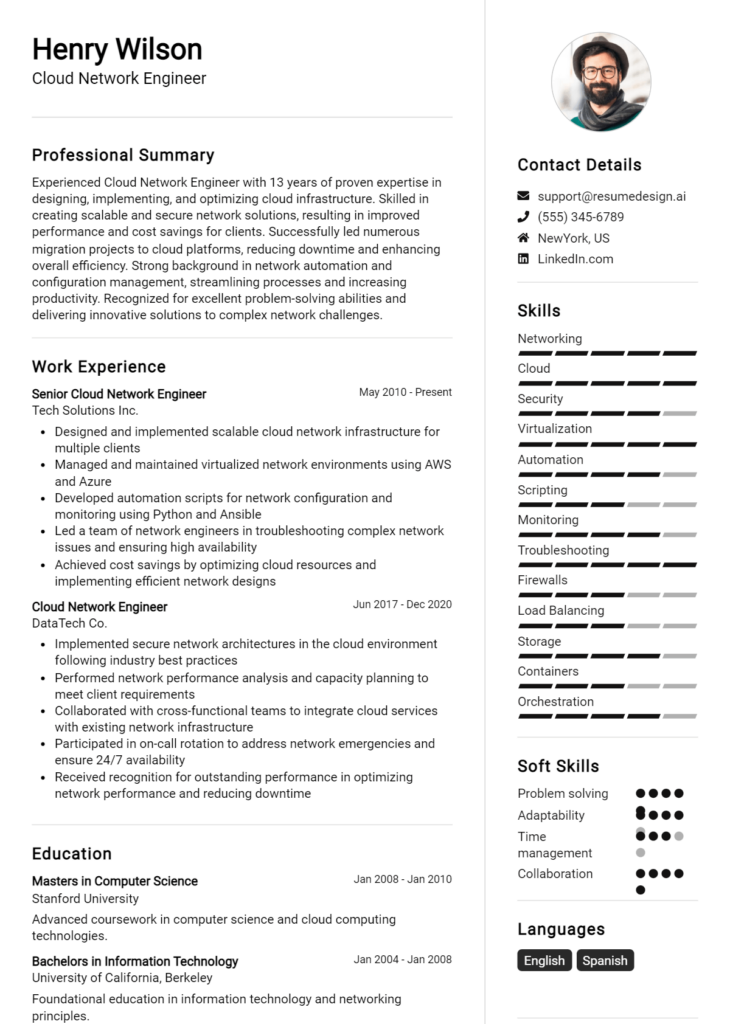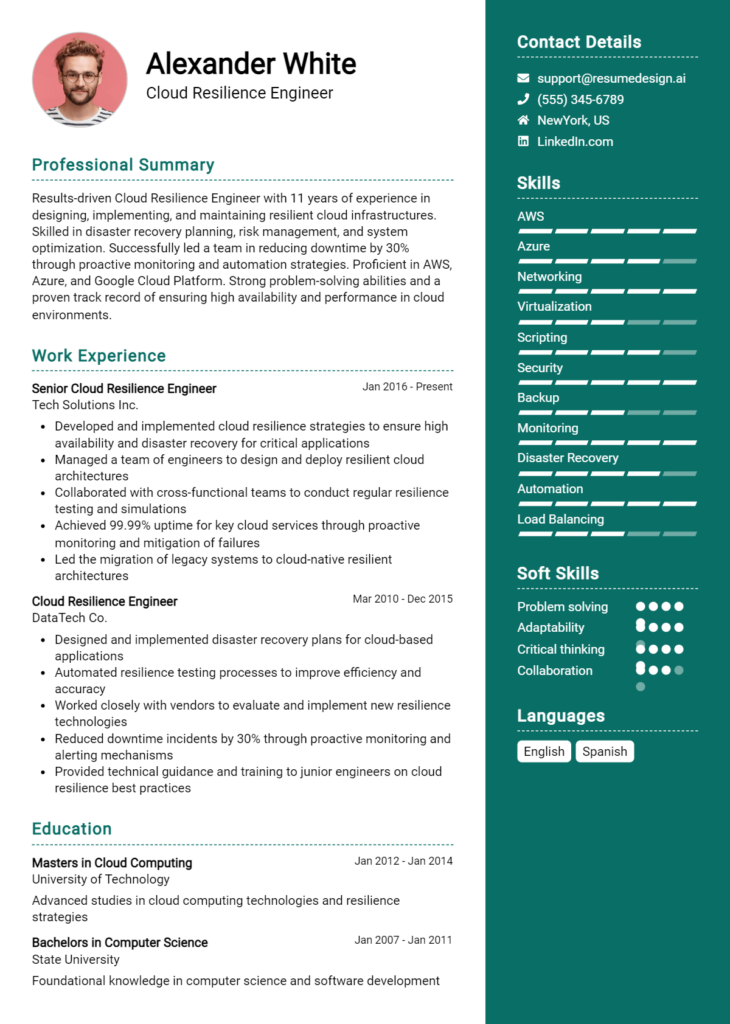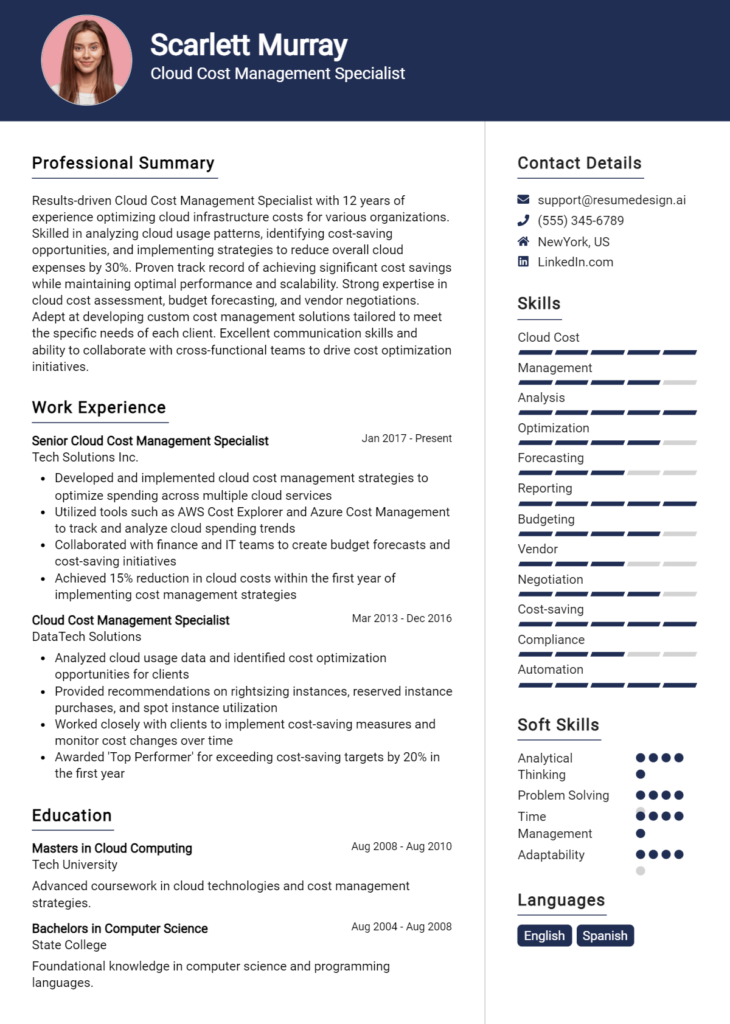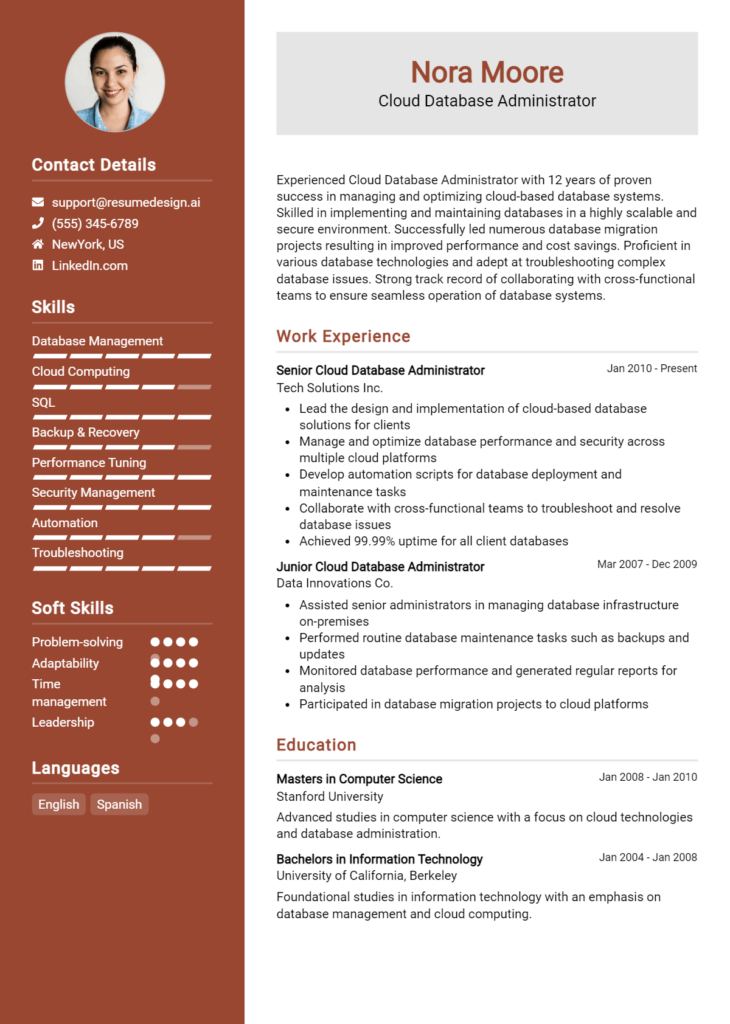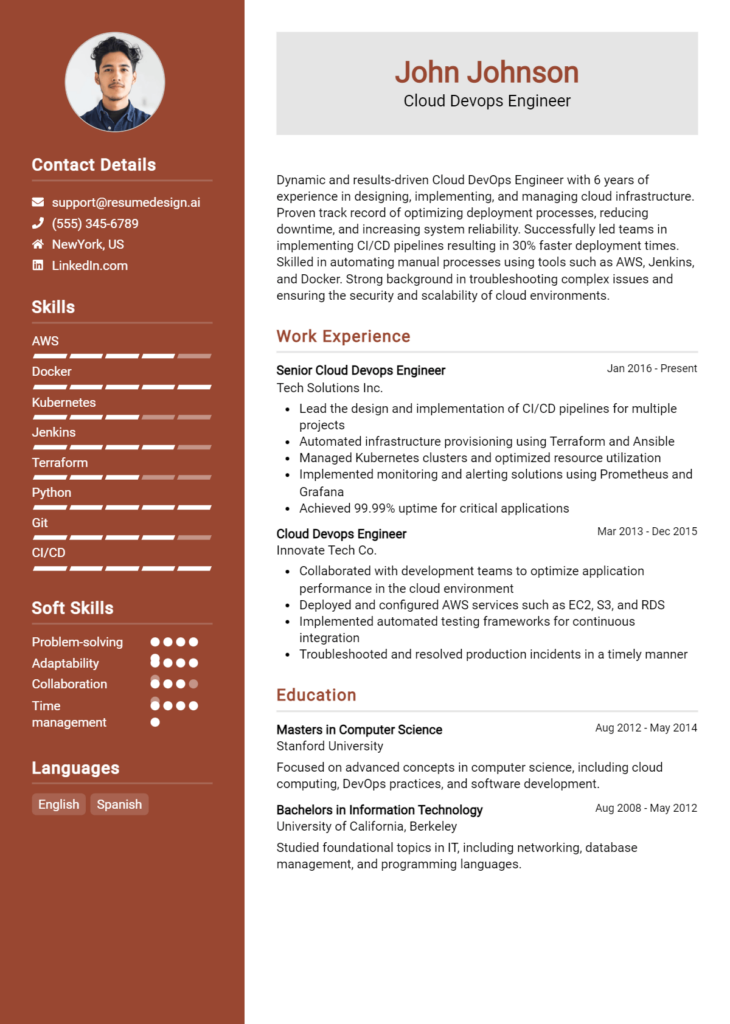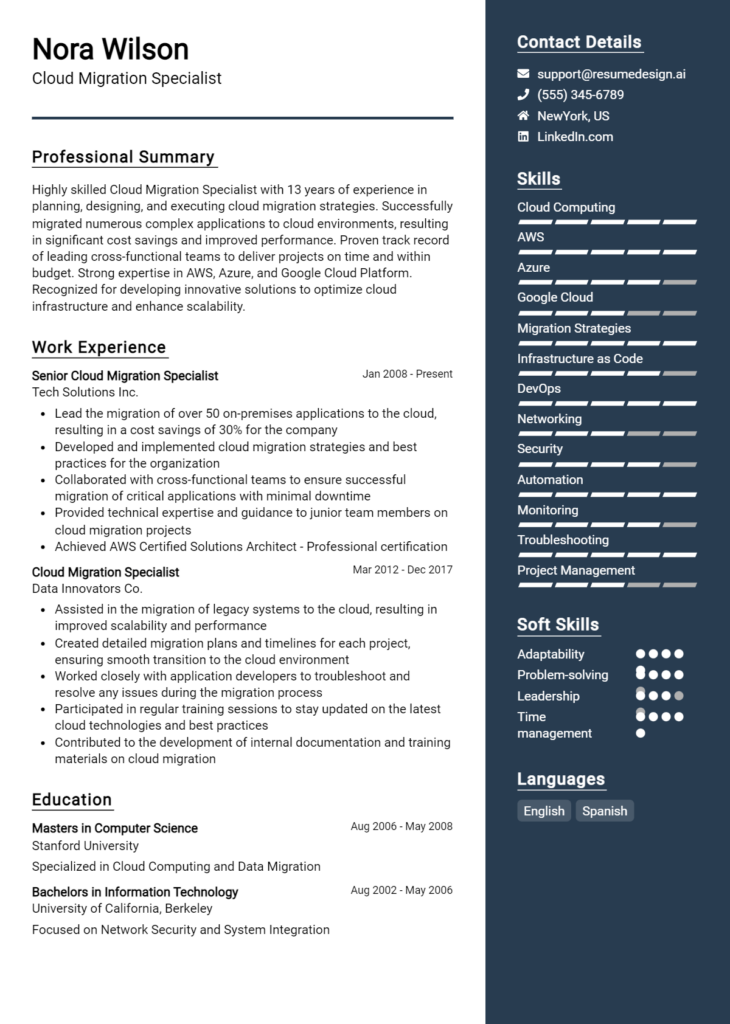Cloud Orchestration Specialist Core Responsibilities
A Cloud Orchestration Specialist plays a pivotal role in integrating various cloud services and ensuring seamless communication between IT, development, and operations teams. Key responsibilities encompass designing automated workflows, monitoring cloud environments, and optimizing resource allocation. Essential skills include strong technical knowledge of cloud platforms, operational insight, and robust problem-solving capabilities. These skills not only enhance team collaboration but also drive organizational efficiency and innovation. A well-crafted resume effectively highlights these competencies, aligning with the company’s strategic objectives.
Common Responsibilities Listed on Cloud Orchestration Specialist Resume
- Design and implement automated cloud workflows and processes.
- Monitor cloud infrastructure and applications for performance and reliability.
- Collaborate with development and operations teams to streamline cloud deployments.
- Manage cloud resource allocation and optimization strategies.
- Develop and maintain documentation for cloud orchestration processes.
- Ensure compliance with security and regulatory standards in cloud environments.
- Troubleshoot and resolve cloud-related technical issues.
- Evaluate and recommend new cloud technologies and tools.
- Conduct training sessions for team members on cloud orchestration best practices.
- Integrate third-party services and APIs into existing cloud solutions.
- Collaborate with stakeholders to align cloud strategies with business goals.
- Analyze cloud usage and costs to propose budgetary improvements.
High-Level Resume Tips for Cloud Orchestration Specialist Professionals
In today's competitive job market, a well-crafted resume is essential for Cloud Orchestration Specialist professionals looking to make a strong impression on potential employers. Your resume often serves as the first point of contact and can significantly influence whether you progress to the interview stage. It must effectively showcase your unique skills, relevant experience, and notable achievements within the field of cloud orchestration. This guide aims to provide practical and actionable resume tips specifically tailored for Cloud Orchestration Specialist professionals, helping you stand out in a crowded applicant pool.
Top Resume Tips for Cloud Orchestration Specialist Professionals
- Tailor your resume for each job application by aligning your skills and experiences with the specific requirements outlined in the job description.
- Highlight relevant certifications, such as AWS Certified Solutions Architect or Google Cloud Professional Cloud Architect, to showcase your expertise.
- Quantify your achievements wherever possible, such as mentioning the percentage of cost savings achieved through efficient orchestration processes.
- Use industry-specific terminology and keywords to ensure your resume resonates with recruiters and applicant tracking systems (ATS).
- Showcase your experience with popular orchestration tools like Kubernetes, Terraform, or Ansible, emphasizing your hands-on knowledge.
- Incorporate a summary statement at the top of your resume that succinctly captures your professional background and key strengths.
- Focus on outcomes by detailing how your contributions led to improved system performance, uptime, or user satisfaction.
- Include soft skills like teamwork and communication, as they are crucial for collaborating with cross-functional teams in cloud environments.
- Keep your resume concise, ideally one page, to ensure clarity and easy readability for hiring managers.
- Regularly update your resume with new skills, projects, and accomplishments to reflect your ongoing professional development.
Implementing these tips can significantly enhance your chances of landing a job in the Cloud Orchestration Specialist field. A carefully crafted resume that effectively showcases your qualifications and achievements will not only grab the attention of hiring managers but also convey your readiness to contribute to their organization's success in cloud orchestration.
Why Resume Headlines & Titles are Important for Cloud Orchestration Specialist
In the competitive field of cloud orchestration, a resume that stands out can make all the difference in securing an interview. A well-crafted resume headline or title serves as the first impression, encapsulating a candidate's core qualifications and expertise in a concise manner. For a Cloud Orchestration Specialist, this means presenting a clear and impactful phrase that immediately grabs the attention of hiring managers. A strong headline not only highlights relevant skills and experiences but also aligns closely with the specific job requirements, effectively summarizing the candidate’s value proposition in just a few words. This strategic approach ensures that the resume resonates with hiring managers looking for the right expertise in cloud orchestration.
Best Practices for Crafting Resume Headlines for Cloud Orchestration Specialist
- Keep it concise: Aim for one impactful phrase that captures your essence.
- Be role-specific: Tailor the headline to reflect the specific requirements of the Cloud Orchestration Specialist position.
- Highlight key skills: Include relevant technical skills or certifications that set you apart.
- Use action-oriented language: Choose dynamic verbs that convey your expertise and enthusiasm.
- Incorporate industry keywords: Utilize terms and phrases commonly found in the job description.
- Avoid jargon: Ensure the language is clear and understandable to a broad audience.
- Reflect your experience level: Indicate your proficiency, whether you are a seasoned expert or a rising talent.
- Align with your career goals: Make sure the headline reflects your aspirations within cloud orchestration.
Example Resume Headlines for Cloud Orchestration Specialist
Strong Resume Headlines
"Certified Cloud Orchestration Specialist with 5+ Years of Experience in Automated Deployment"
“Expert in Multi-Cloud Management and CI/CD Pipeline Optimization”
“Dynamic Cloud Orchestration Professional Specializing in Cost Optimization and Scalability”
“Results-Driven Cloud Architect with Proven Track Record in Infrastructure Automation”
Weak Resume Headlines
“Cloud Specialist”
“Experienced IT Professional”
“Looking for a Job in Cloud Computing”
The strong headlines listed above are effective because they clearly communicate specific skills, experiences, and accomplishments related to the Cloud Orchestration Specialist role, making them compelling for hiring managers. They are direct, informative, and tailored to the job, increasing the likelihood of catching attention. In contrast, the weak headlines fail to impress due to their vagueness and lack of specific details. They do not convey the candidate’s unique qualifications or enthusiasm for the role, which can lead to missed opportunities in a competitive job market.
Writing an Exceptional Cloud Orchestration Specialist Resume Summary
A well-crafted resume summary is crucial for a Cloud Orchestration Specialist as it serves as a powerful introduction that can make a significant impact on hiring managers. In a competitive job market, a strong summary quickly showcases the candidate's key skills, relevant experience, and noteworthy accomplishments tailored to the specific job role. By encapsulating vital information concisely, the summary not only captures attention but also sets the tone for the rest of the resume, allowing candidates to present themselves as ideal fits for the position.
Best Practices for Writing a Cloud Orchestration Specialist Resume Summary
- Quantify achievements with specific metrics to demonstrate impact.
- Focus on technical skills relevant to cloud orchestration, such as automation tools and orchestration frameworks.
- Tailor the summary to align with the specific job description and company culture.
- Highlight relevant certifications and training in cloud technologies.
- Use action verbs to convey a sense of initiative and achievement.
- Keep it concise; aim for 3-5 sentences that pack a punch.
- Incorporate keywords from the job listing to pass through Applicant Tracking Systems (ATS).
- Showcase soft skills like problem-solving and teamwork that are essential in collaborative cloud environments.
Example Cloud Orchestration Specialist Resume Summaries
Strong Resume Summaries
Dynamic Cloud Orchestration Specialist with over 5 years of experience in deploying and managing multi-cloud environments. Successfully increased deployment efficiency by 30% through automation and orchestration of services using Kubernetes and Terraform. Proven ability to collaborate with cross-functional teams to drive cloud strategy and optimize infrastructure costs.
Results-driven Cloud Orchestration Specialist with a track record of designing scalable cloud solutions for enterprise applications. Achieved a 40% reduction in operational costs by implementing CI/CD pipelines and enhancing system reliability. AWS Certified Solutions Architect with expertise in container orchestration and microservices architecture.
Cloud Orchestration Specialist skilled in utilizing Ansible and Azure DevOps to streamline deployment processes. Instrumental in reducing deployment times by 50%, leading to faster time-to-market for key projects. Strong background in cloud security practices and compliance frameworks.
Weak Resume Summaries
Experienced IT professional looking for a position in cloud orchestration. Knowledgeable about cloud technologies and eager to learn more.
Cloud specialist with some experience in various technologies. Good at working with teams and solving problems.
The strong resume summaries are effective because they provide quantifiable results and specific skills that directly relate to the Cloud Orchestration Specialist role, demonstrating clear value to potential employers. In contrast, the weak summaries are vague and lack measurable outcomes, making it difficult for hiring managers to gauge the candidate's qualifications or relevance to the position. Being specific and results-oriented is key in creating a compelling narrative in the resume summary.
Work Experience Section for Cloud Orchestration Specialist Resume
The work experience section of a Cloud Orchestration Specialist resume is a critical component that provides potential employers with insights into the candidate's technical abilities, leadership qualities, and capacity to produce high-quality deliverables. This section not only illustrates the candidate's expertise in cloud technologies and orchestration tools but also emphasizes their experience in managing teams and projects effectively. Highlighting quantifiable achievements, such as successful project completions or efficiency improvements, and aligning this experience with industry standards is essential for standing out in a competitive field.
Best Practices for Cloud Orchestration Specialist Work Experience
- Clearly articulate your technical skills, focusing on relevant cloud platforms and orchestration tools.
- Quantify your accomplishments with metrics, such as percentage improvements or cost savings.
- Highlight leadership roles and collaborative projects that showcase your ability to manage teams.
- Use industry-standard terminology to align your experience with job requirements.
- Include specific examples of successful cloud deployments or migrations.
- Demonstrate problem-solving skills through examples of challenges faced and solutions implemented.
- Tailor your work experience to match the job description of the position you are applying for.
- Keep descriptions concise and focused on results, avoiding jargon that may confuse the reader.
Example Work Experiences for Cloud Orchestration Specialist
Strong Experiences
- Led a cross-functional team to implement a cloud orchestration solution that reduced deployment times by 40%, enhancing overall operational efficiency.
- Designed and executed a multi-cloud strategy that resulted in a 30% reduction in costs while maintaining high availability and performance.
- Managed the migration of over 100 applications to a cloud environment, achieving a 99.9% uptime and receiving positive feedback from stakeholders.
- Developed automation scripts that decreased manual provisioning time by 50%, significantly improving resource allocation and team productivity.
Weak Experiences
- Worked on cloud projects without specifying the nature or outcome of the work done.
- Assisted in team efforts without detailing specific contributions or achievements.
- Involved in cloud management tasks with vague descriptions that lack quantifiable results.
- Helped implement cloud solutions but did not mention the scale or impact of those solutions.
The examples provided illustrate the distinction between strong and weak experiences based on clarity, specificity, and measurable outcomes. Strong experiences highlight concrete achievements and leadership roles, showcasing the candidate's capability to deliver tangible results in cloud orchestration. In contrast, weak experiences lack detail and quantifiable impact, making it difficult for potential employers to gauge the candidate's true abilities and contributions.
Education and Certifications Section for Cloud Orchestration Specialist Resume
The education and certifications section of a Cloud Orchestration Specialist resume is crucial in establishing the candidate's foundational knowledge and specialized skills in cloud computing technologies. This section showcases the academic background that supports the candidate's technical expertise, as well as industry-relevant certifications that demonstrate their commitment to continuous learning and professional development. By providing detailed information about relevant coursework, certifications, and specialized training, candidates can significantly enhance their credibility and align themselves more closely with the expectations of hiring managers in the cloud orchestration field.
Best Practices for Cloud Orchestration Specialist Education and Certifications
- Include only relevant degrees and coursework that directly relate to cloud orchestration or cloud computing.
- List industry-recognized certifications, such as AWS Certified Solutions Architect or Microsoft Certified: Azure Solutions Architect Expert.
- Provide the date of certification and any expiration dates, if applicable, to showcase up-to-date knowledge.
- Highlight specialized training in cloud orchestration tools and platforms that are commonly used in the industry.
- Include any relevant online courses or MOOCs that demonstrate ongoing education in emerging cloud technologies.
- Use specific language that aligns with the job description to demonstrate a clear understanding of the role's requirements.
- Order the entries by relevance, placing the most pertinent education and certifications at the top.
- Consider including honors or recognitions that underscore academic excellence or professional accomplishments in the field.
Example Education and Certifications for Cloud Orchestration Specialist
Strong Examples
- Bachelor of Science in Computer Science, University of Technology, 2020
- AWS Certified Solutions Architect – Associate, March 2021
- Google Cloud Professional Cloud Architect, July 2022
- Specialized Training in Kubernetes and Docker, Online Course, Completed August 2023
Weak Examples
- Associate Degree in General Studies, Community College, 2018
- Certification in Basic Computer Skills, 2019
- Outdated Cisco Certified Network Associate (CCNA), 2015
- High School Diploma, 2016
The examples given illustrate strong educational and certification backgrounds that are directly relevant to the role of a Cloud Orchestration Specialist, showcasing a blend of technical knowledge and industry-recognized credentials. In contrast, the weak examples demonstrate qualifications that lack relevance to cloud orchestration or are outdated, failing to effectively convey the candidate's current capabilities or commitment to the field. By focusing on strong examples, candidates can significantly improve their chances of making a positive impression on potential employers.
Top Skills & Keywords for Cloud Orchestration Specialist Resume
As a Cloud Orchestration Specialist, showcasing the right skills in your resume is crucial to stand out in a competitive job market. Employers look for a specific blend of technical expertise and interpersonal abilities that enable candidates to effectively manage cloud resources, automate processes, and ensure seamless integration across platforms. Highlighting both hard and soft skills not only demonstrates your qualifications but also your capability to adapt and thrive in a dynamic cloud environment. A well-structured resume that includes these skills can significantly enhance your chances of landing an interview and ultimately securing a role in this rapidly evolving field.
Top Hard & Soft Skills for Cloud Orchestration Specialist
Soft Skills
- Strong problem-solving abilities
- Excellent communication skills
- Team collaboration and interpersonal skills
- Adaptability and flexibility
- Time management and organization
- Critical thinking and analytical skills
- Attention to detail
- Customer service orientation
- Initiative and self-motivation
- Conflict resolution skills
- Creativity and innovation
- Ability to work under pressure
- Effective decision-making
Hard Skills
- Proficiency in cloud platforms (AWS, Azure, Google Cloud)
- Knowledge of container orchestration (Kubernetes, Docker)
- Experience with Infrastructure as Code (Terraform, CloudFormation)
- Scripting languages (Python, Bash, PowerShell)
- Understanding of CI/CD pipelines and DevOps practices
- Familiarity with monitoring and logging tools (Prometheus, ELK Stack)
- Networking fundamentals and cloud security best practices
- Database management (SQL, NoSQL)
- API management and integration strategies
- Configuration management tools (Ansible, Puppet, Chef)
- Knowledge of serverless architecture
- Virtualization technologies (VMware, Hyper-V)
- Performance optimization techniques
- Familiarity with Agile methodologies
- Understanding of multi-cloud strategies
- Cloud cost management and optimization
- Troubleshooting and debugging skills
For an effective resume, consider including these skills along with your work experience to create a comprehensive picture of your capabilities as a Cloud Orchestration Specialist.
Stand Out with a Winning Cloud Orchestration Specialist Cover Letter
As a dedicated Cloud Orchestration Specialist with over five years of experience in cloud computing environments, I am excited to apply for the position at your organization. My deep understanding of cloud infrastructure, automation tools, and orchestration frameworks has enabled me to successfully implement and manage cloud solutions that drive efficiency and scalability. I am particularly drawn to your company’s commitment to innovation and excellence in cloud services, and I believe my expertise aligns perfectly with your goals.
In my previous role at XYZ Corporation, I led a team in migrating our on-premises applications to a multi-cloud environment. This involved designing and implementing orchestration strategies using tools like Kubernetes and Ansible, which resulted in a 30% reduction in deployment times and a significant improvement in resource utilization. My ability to collaborate with cross-functional teams ensured that we met project milestones while adhering to best practices for security and compliance. I am eager to bring this collaborative spirit and hands-on approach to your esteemed company.
Moreover, I have a proven track record of optimizing cloud operations through continuous monitoring and performance tuning. I believe that proactive management is key to maintaining a seamless cloud environment, and I have successfully implemented monitoring solutions that provide real-time insights and alerts. My commitment to continuous learning has also kept me abreast of the latest trends and technologies in cloud orchestration, allowing me to propose innovative solutions that enhance operational efficiency.
I am excited about the opportunity to contribute to your team and help drive your cloud initiatives. My passion for cloud technology, combined with my technical skills and experience, makes me a strong candidate for this role. I look forward to the possibility of discussing how I can help your organization achieve its cloud goals and further enhance its service offerings. Thank you for considering my application.
Common Mistakes to Avoid in a Cloud Orchestration Specialist Resume
When crafting a resume for a Cloud Orchestration Specialist position, it's crucial to present a clear and compelling narrative of your skills and experiences. However, many candidates fall into common pitfalls that can undermine their chances of standing out in a competitive job market. By avoiding these frequent mistakes, you can enhance the impact of your resume and better showcase your qualifications to potential employers.
Ignoring Keywords: Failing to incorporate relevant keywords from the job description can make your resume less likely to pass through Applicant Tracking Systems (ATS) that filter candidates based on specific terms.
Vague Job Descriptions: Providing generic descriptions of your previous roles can dilute the impact of your experience. Use specific examples and metrics to demonstrate your contributions and achievements in past positions.
Lack of Relevant Certifications: Not highlighting relevant cloud certifications (such as AWS, Azure, or Google Cloud) can lead to missed opportunities. Certifications validate your expertise and commitment to the field.
Overloading with Technical Jargon: While technical skills are essential, using excessive jargon can alienate hiring managers. Aim for clear and concise language that effectively communicates your abilities without overwhelming the reader.
Neglecting Soft Skills: Focusing solely on technical skills while overlooking soft skills like communication, collaboration, and problem-solving can be detrimental. Cloud orchestration often requires teamwork and the ability to navigate organizational dynamics.
Not Tailoring the Resume: Submitting a one-size-fits-all resume can signal a lack of interest in the specific role. Tailor your resume to align with the specific requirements and culture of the organization you’re applying to.
Formatting Issues: Poor formatting, such as inconsistent fonts, lack of white space, or overly complex layouts, can make your resume difficult to read. Aim for a clean, professional design that highlights key information effectively.
Excessive Length: A resume that is too long can deter hiring managers from reading it thoroughly. Keep it concise, ideally one page for less experienced candidates and two pages for those with extensive experience, focusing on the most relevant information.
Conclusion
In conclusion, the role of a Cloud Orchestration Specialist is crucial in today's technology-driven landscape. This position requires a deep understanding of cloud services, automation tools, and orchestration frameworks to effectively manage and optimize cloud environments. Key responsibilities include streamlining deployment processes, ensuring system reliability, and integrating various cloud services to enhance overall performance.
As the demand for cloud solutions continues to grow, so does the need for skilled professionals in this field. Therefore, it's important to ensure that your resume effectively highlights your expertise and aligns with industry standards.
We encourage you to take a moment to review your Cloud Orchestration Specialist resume. Ensure it showcases your relevant skills, experiences, and accomplishments clearly and concisely. To assist you in this process, consider utilizing the following resources:
- Explore resume templates that can provide a professional layout for your document.
- Use a resume builder to create a tailored resume that stands out.
- Check out resume examples for inspiration and ideas on how to present your qualifications effectively.
- Don’t forget to craft a compelling cover letter using our cover letter templates to complement your resume.
Taking these steps will significantly enhance your job application and improve your chances of landing that coveted position as a Cloud Orchestration Specialist.

